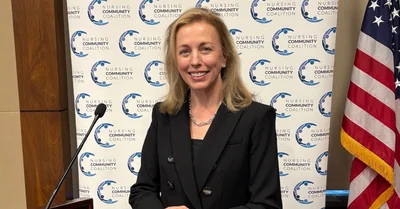As the United States battles to find a balance between spending and creating more debt, national politicians are contending with arguments over how much funding to allot for a variety of services.
The Senate Appropriations Subcommittee on Energy and Water Development heard testimony May 24 about the benefits that an 8.7% higher budget allocation would have for the country.
“Our adversaries are doing everything they can to get ahead, so if we’re going to continue to lead on the world stage, we have to lock arms, work together, and make sure our funding keeps pace at this critical moment,” said Sen. Patty Murray (D-Wash.) as she chaired the hearing in Sen. Dianne Feinstein’s (D-Calif.) stead.
She defended President Joe Biden's proposed budget request for fiscal year 2024, which includes $52 billion for the Department of Energy, representing an increase of 8.7% over fiscal year 2023's enacted budget, Utility Dive reported.
Of the $52 billion, $11.9 billion would go toward climate and clean energy research and development and $8.8 billion would fund the department's Office of Science, in part to identify and develop new clean energy technology. Almost $4.5 billion would finance clean energy infrastructure initiatives, such as weatherizing low-income homes and electrifying tribal homes.
Murray said the DOE’s programs have “tremendous implications” for national security and global competitiveness as the agency works to keep energy supplies clean, cheap and abundant.
The senators heard from David Turk, deputy secretary for the DOE, and Jill Hruby, undersecretary for the National Nuclear Security Administration (NNSA).
“We have taken critical steps to ensure the United States can outmaneuver aggressors, outcompete our rivals and create new jobs and opportunities for all our people,” Turk said, adding that the president’s budget request will “empower us to drive these endeavors forward, even in the face of emerging and historic challenges.”
One point of contention was in connection with climate change and how much to spend in the push toward green energy, especially with House Republicans urging more fiscal responsibility that would cut DOE spending to 2022 levels.
Murray asked how such a move would affect working-class Americans. Turk said many would miss out on rebates for upgrading energy efficiency in homes. He also said the DOE would have to cut its work force by 5,200 scientists, putting the nation's competitiveness on the global energy stage at risk.
Sen. John Kennedy (R-La.) said green energy is a good thing but asked how much going carbon neutral by 2050 will cost. Turk couldn’t answer that, so Kennedy went with the $50 trillion estimate that has been floated.
He then asked Turk by how much spending $50 trillion would reduce average world temperatures. Again, Turk couldn’t give a specific answer, although when Sen. Martin Heinrich (D-N.M.) followed up, Turk said there would be “orders of magnitude” difference if the U.S. doesn’t do its part to reduce emissions.
Kennedy, who said you can tell what a government believes in by “following the money,” also questioned why green energy projects would see a 38% increase in spending, while fossil fuel would get a mere 2% more and nuclear power, which the DOE website describes as the “most reliable energy source,” would actually get a 12% reduction. He wondered if the spending plan has its priorities correct.
Energy Secretary Jennifer Granholm, who was not at the hearing because of illness, has commended the budget request, saying it demonstrates the administration's commitment to clean energy.
“The budget provides DOE critical resources to transform the president’s historic clean energy investments and ambitious climate vision into reality, laying the foundation for an inclusive 21st Century economy that lifts up communities everywhere while boldly facing the climate crisis head-on," Granholm said in an earlier DOE release.
The hearing also examined funding for nuclear security. The fiscal year 2024 request of $23.8 billion for DOE's National Nuclear Security Administration (NNSA) is the largest in history, representing a $1.7 billion increase over the fiscal year 2023 enacted budget. The funds will go toward modernizing warheads, refurbishing production facilities and maintaining technology and engineering capabilities.
Sen. John Hoeven (R-N.D.) asked Hruby to update the panel on how her division is meeting cost and timing schedules.
“The weapon modernization program is on schedule and synced up with the Department of Defense,” Hruby said, but added that infrastructure modernization plans are experiencing delays and cost overruns that the NNSA is trying to rein in.
Murray summed up the need to keep investing in the DOE and not take funding back to bare-bones levels.
“If we invest in clean energy and bring jobs to our shores, it’s also an opportunity to ensure that the U.S. remains the energy superpower of the 21st Century,” Murray said. “This budget request shows the Biden administration is committed to making the investments we need to maintain our competitive edge.”









